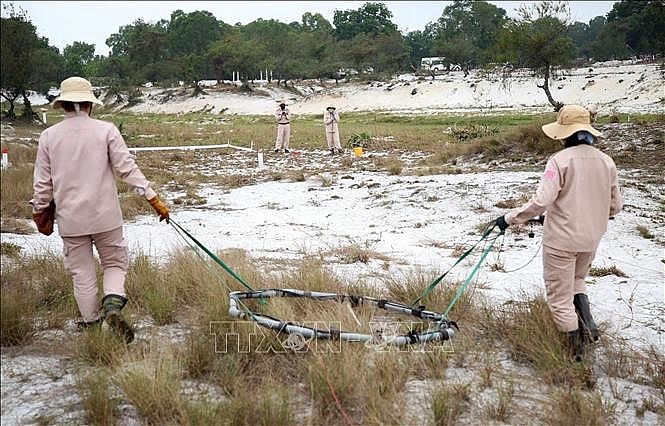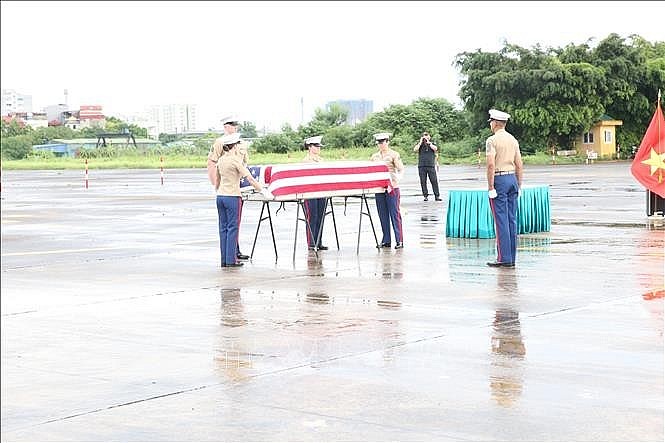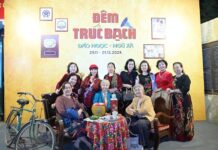Dr. Andrew Wells-Dang, leading the Vietnam War Legacy and Reconciliation Initiative at the US Institute of Peace (USIP), emphasized that a distinctive aspect of Vietnam – US relations is the foundation of diplomatic relations built by the people, including veterans, students, entrepreneurs, and non-governmental development organizations.
Regarding the post-war era, Wells-Dang noted that trust and cooperation between the two peoples had been established before diplomatic progress was achieved at the state level. Strengthened bilateral relations are supported by almost all socio-political groups, marking a significant milestone in the post-war reconciliation process.
 |
| Members of MAT 19 search for explosives with specialized machines in the sandy area of Hai Lang district. (Photo: VNA) |
Over the years, American non-governmental organizations, foundations, and individuals who collaborate with the Viet Nam Union of Friendship Organizations have provided an estimated value of millions of dollars in support to aid war victims in Vietnam. Assistance has included constructing charity homes, cultural facilities, and libraries, as well as providing gifts and livestock to those residing in remote, impoverished areas and belonging to ethnic minorities. Numerous American student groups have volunteered and donated resources to people with disabilities and victims of Agent Orange/dioxin in Vietnam.
Many veterans, children, and relatives of American soldiers who lost their lives in Vietnam have evolved from simply understanding the past’s truth to taking concrete actions to support Vietnam in overcoming the consequences of war. Certain projects have yielded positive results in fostering reconciliation, such as organizing reunions between individuals on opposing sides of the conflict and between family members of deceased or wounded soldiers. Additionally, there are projects undertaken by Americans who lost loved ones in the Vietnam War to aid in the construction of homes for the underprivileged in Vietnam.
Many Americans witnessed the severe post-war consequences that the Vietnamese people have endured for nearly half a century and decided to contribute to overcoming these challenges and developing Vietnam and Vietnam-USA relations. Scholars, researchers, and journalists have visited Vietnam to write books, articles, produce films, and capture images that portray the American war in Vietnam and its aftermath, as well as Vietnam’s accomplishments and challenges in nation-building.
 |
| The Vietnam Office for Seeking Missing Persons (VNOSMP) handed over a set of remains of US soldiers missing during the war in Vietnam to the US side. (Photo: VNA broadcast) |
In recognition of the altruism and generosity shown by the Vietnamese people in assisting the recovery of missing American soldiers, while many Vietnamese mothers, wives, and families have yet to locate their loved ones, an increasing number of American veterans and their families are visiting Vietnam, bringing with them hundreds of records, documents, and battlefield memorabilia to contribute to Vietnamese authorities, martyrs’ families, or museums, facilitating the search for the remains of soldiers who perished or disappeared on the battlefields.
International security researcher David Johnson of Stanford Law University remarked, “The relationship between Vietnam and the USA exemplifies not only the healing of past wounds but also the transformative power of understanding and cooperation in diplomacy.”
In recent years, education about the war in American schools has gained increased attention and emphasis, fostering a deeper understanding of this pivotal event in the two nations’ histories among students. The lessons learned from the war hold profound implications for peace, human rights, and cultural diversity. Comprehending the mistakes and consequences of the war can aid in preventing similar occurrences in the future. The incorporation of the war into the educational curriculum also educates the younger generation in the USA about Vietnam’s culture, geography, and people, facilitating a deeper understanding of Vietnam’s heritage and traditions and contributing to the strengthening of ties between the two countries. More young Americans are visiting Vietnam, building bridges of understanding between the two nations.
Dr. Andrew Wells-Dang believes that as the veteran generation ages, it becomes imperative for the younger generation of both countries to gain a thorough understanding of the war, its brutality, and the losses suffered by both sides, thereby contributing to reconciliation and the advancement of relations between the two countries.
Ron Carver, Executive Director of the Waging Peace in Vietnam Education Fund, collaborated with a group of veterans and historians in the US to compile two books, one in English and the other in Vietnamese, exploring the role of peace-loving veterans in ending the war. The group presented the collection at 19 universities in the US and 8 universities in Vietnam.
Ron Carver expressed his aspirations to organize a conference where American and Vietnamese historians could engage in discussions about the war’s conclusion and future strategies for cooperation. The event is запланировано на следующий год to commemorate the 50th anniversary of the war’s end. This initiative represents another facet of people-to-people cooperation, fostering understanding and preserving the memories of war.
The War Remnants Museum in Ho Chi Minh City and the United States Agency for International Development (USAID) signed a Memorandum of Understanding to collaborate on the implementation of a gallery showcasing the joint efforts of the two countries in overcoming the consequences of war. This collaborative exhibition space is scheduled to open in 2025. There will be a permanent exhibition area curated by veterans from Kentucky, displaying works by war photographers from Vietnam and Western nations.
Professor John Smith from the Department of Political Science at Harvard University remarked that the relationship between Vietnam and the USA has “progressed remarkably since the post-war era. Cooperation and the rebuilding of the relationship have laid the groundwork for a promising future.”
Professor Sarah Brown, specializing in diplomacy and international relations at Columbia University, stated, “The establishment of a relationship between Vietnam and the USA based on mutual respect and shared interests has created a beacon of hope in the multifaceted landscape of modern international relations.”
Even during the war, the USA witnessed massive waves of anti-war protests, conveying a powerful message from peace-loving Americans. In the aftermath of the war, people-to-people diplomacy initiatives emerged as a bridge to heal the wounds of war, fostering trust and elevating Vietnam-USA relations to new heights.








